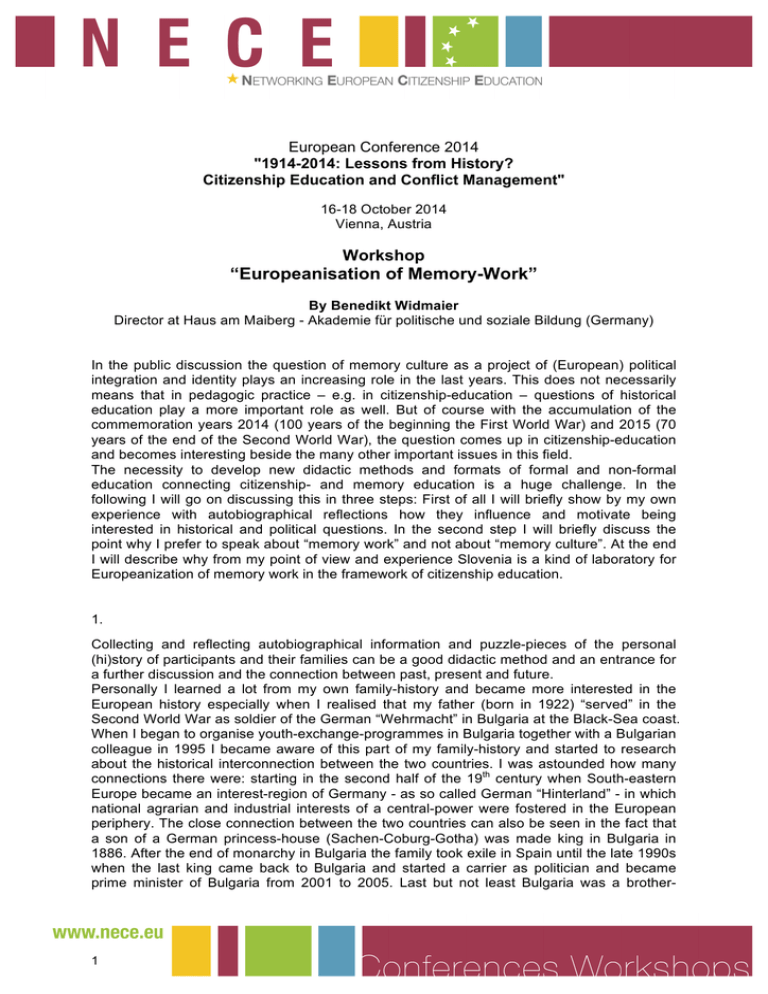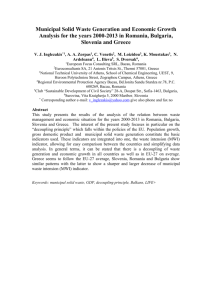Document 13157253
advertisement

European Conference 2014 "1914-2014: Lessons from History? Citizenship Education and Conflict Management" 16-18 October 2014 Vienna, Austria Workshop “Europeanisation of Memory-Work” By Benedikt Widmaier Director at Haus am Maiberg - Akademie für politische und soziale Bildung (Germany) In the public discussion the question of memory culture as a project of (European) political integration and identity plays an increasing role in the last years. This does not necessarily means that in pedagogic practice – e.g. in citizenship-education – questions of historical education play a more important role as well. But of course with the accumulation of the commemoration years 2014 (100 years of the beginning the First World War) and 2015 (70 years of the end of the Second World War), the question comes up in citizenship-education and becomes interesting beside the many other important issues in this field. The necessity to develop new didactic methods and formats of formal and non-formal education connecting citizenship- and memory education is a huge challenge. In the following I will go on discussing this in three steps: First of all I will briefly show by my own experience with autobiographical reflections how they influence and motivate being interested in historical and political questions. In the second step I will briefly discuss the point why I prefer to speak about “memory work” and not about “memory culture”. At the end I will describe why from my point of view and experience Slovenia is a kind of laboratory for Europeanization of memory work in the framework of citizenship education. 1. Collecting and reflecting autobiographical information and puzzle-pieces of the personal (hi)story of participants and their families can be a good didactic method and an entrance for a further discussion and the connection between past, present and future. Personally I learned a lot from my own family-history and became more interested in the European history especially when I realised that my father (born in 1922) “served” in the Second World War as soldier of the German “Wehrmacht” in Bulgaria at the Black-Sea coast. When I began to organise youth-exchange-programmes in Bulgaria together with a Bulgarian colleague in 1995 I became aware of this part of my family-history and started to research about the historical interconnection between the two countries. I was astounded how many connections there were: starting in the second half of the 19th century when South-eastern Europe became an interest-region of Germany - as so called German “Hinterland” - in which national agrarian and industrial interests of a central-power were fostered in the European periphery. The close connection between the two countries can also be seen in the fact that a son of a German princess-house (Sachen-Coburg-Gotha) was made king in Bulgaria in 1886. After the end of monarchy in Bulgaria the family took exile in Spain until the late 1990s when the last king came back to Bulgaria and started a carrier as politician and became prime minister of Bulgaria from 2001 to 2005. Last but not least Bulgaria was a brother- 1 country of East Germany (GDR) in the family of communist countries from 1945 until 1990, a fact, which should not be forgotten. To sum it up in our context, we can see, that family history can be an important puzzle for someone in his growing knowledge about international interconnection of history. 2. Memory work in the framework of Citizenship Education and International (Youth) Exchange is a necessary bottom-up process. Within this process national standards of commemoration can be compared and the highly interconnected history of European countries can be better understood by citizens. Pan-European memory culture can only be a result of (international) memory work done by citizen’s themselves. Many political top-down projects of commemoration - such as museums, the task force activities on Holocaust Education, the growing number of commemoration days – are almost linked to the believe that (national or European) identity can be built throughout such regulations. Opposite to that I am sure that a regulated commemoration is not really fruitful in such complex matters like (political) history. Therefore I prefer an additional bottom-upstrategy within citizenship learning processes which means that people should learn more about conflicts and alternatives in the certain historical situation. The aim should be that they (1) learn more about the complex issue, that they can (2) build up their own judgement. (3) They should compare the historical situation with the present and (4) work out strategies and alternatives for the future, which are based on human rights and values of democracy. All these steps, which are from my point of view inevitable in a pedagogic process of citizenship education, will not lead to an aim, if they are not connected with the personal situation of the learning-subjects, the learners. Here we can come back to what was said above about the chance of autobiographical- and family-history as an entrance to historical learning in general. There are a lot of methods, which aim to connect the live of learners with the object of learning. That challenges – so to say - the creativity and competence of the pedagogues. 3. In the last step I would like to share an experience concerning the question of PanEuropeanization with you. I accompanied a seminar of a learning-group to Slovenia in 2013. The event was part of an international co-operation between my institution (Haus am Maiberg/Germany) and our Slovenian partner (Socialna Academija in Ljubljana). From the seminar I took the impression, that for different reasons Slovenia offers some kind of laboratory for the study of Pan-European History: Many European countries were involved in the history and conflicts in South-EasternEuropa. § If we only have a look at the times since the late 19th century we can see especially the influence of the Austro-Hungarian Monarchy, later the influence of the then divided countries Austria and Hungary. Beside this, the influence of Serbia and Croatia (with direct connection to the Yugoslavian war in the 1990s). And last but not least the influence of fascist Italy, Nazi-Germany and the communist Soviet-Union. Especially for International Youth Exchange this provides the chance to involve partner organisations and participants of these countries and analyse the history of Slovenia under the special view of the influence of their own countries. 2 The conflicts of the second half of the 1940s in Slovenia between Partisans and Domobrancies are still virulent in current society and politics: § I have never visited a country where I had the impression that history is so present and influential on present policy than it is in Slovenia. This has to do with the long Yugoslavian period in which quarrels about historical conflicts between the diverse nations and parts of the nations were hidden under an artificial construction of brotherhood. After the division of Yugoslavia in the post-Tito-years the question of quarrels and commemoration about this dark part of national history broke out so strong and did not come to an end until now. This makes Slovenia an interesting laboratory in which we can not only study but also feel how important historical influences can be for the present situation of a country. Slovenia has many commemoration points and places linked to different aspects of the history. Many of them are known but not yet seen as official memorials from the two quarrelling sides. For further details: Video of the History-Seminar 2013 in Slovenia: https://www.youtube.com/watch?v=IN96-DjQ9bY Video of a panel-discussion on the question of „Commemoration in Slovenia“ https://www.youtube.com/watch?v=gVej3eRzehQ Worked out article on the above discussed question: Benedikt Widmaier, Europäisierung der Erinnerungsarbeit, in: Benedikt Widmaier/Gerd Steffens (Ed.), Politische Bildung nach Auschwitz. Erinnerungsarbeit und Erinnerungskultur heute, (Non-formale politische Bildung, Vol. 5), Schwalbach/Ts. 2015, page: 163-175. 3





